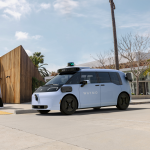
- Mobility Tech
Waymo Launches Atlanta Robotaxi Service Through Uber Partnership
5 minute read

Robotaxi service expands through major U.S. cities as Waymo vehicles join Uber’s fleet across 65 square miles of Atlanta
Three Key Facts
- Waymo launches in Atlanta with Uber partnership – The robotaxi service covers 65 square miles and integrates autonomous vehicles into standard UberX rides, marking the second major U.S. city for this collaboration model.
- Uber shares surge 8% on expansion news – Investor confidence reflects the strategic move toward cost reduction and automation, with Uber reporting 1.5 million annual autonomous vehicle trips across its network.
- Service operates without airport access initially – Atlanta follows the Austin model where Waymo vehicles serve urban areas but exclude airport routes, with plans to deploy hundreds of autonomous vehicles within the next few years.
Introduction
Waymo officially launches its robotaxi service in Atlanta through a partnership with Uber, allowing residents to hail self-driving vehicles starting today. The expansion covers approximately 65 square miles of the metropolitan area, integrating Waymo’s autonomous vehicles directly into Uber’s standard ride options.
The Atlanta launch follows the successful deployment in Austin, Texas, where the companies have established a collaborative model that combines Uber’s logistics platform with Waymo’s autonomous vehicle technology. This marks a significant step in mainstream adoption of self-driving ride-hailing services across major U.S. markets.
Key Developments
The service operates through a seamless integration model where Atlanta riders selecting UberX, Comfort, or Comfort Electric may be matched with a Waymo autonomous vehicle. Users can opt into the service through ride preferences in the Uber app, though they retain the option to switch to human-driven vehicles when matched with a robotaxi.
Waymo deploys Jaguar I-PACE vehicles equipped with 29 cameras, 5 LIDAR sensors, and 6 RADAR sensors for comprehensive safety monitoring. The vehicles operate in various weather conditions and provide automated voice guidance for passengers throughout their journey.
According to CleanTechnica, riders unlock and manage their trips through the Uber app, with 24/7 customer support available both in-app and via in-car screens. The pricing matches standard Uber rates for comparable service tiers.
Market Impact
Uber Technologies shares jumped 8% following the Atlanta launch announcement, reflecting strong investor confidence in the autonomous vehicle partnership strategy. The market response indicates growing optimism about cost reduction potential through decreased driver dependency.
Waymo currently provides 250,000 paid robotaxi rides weekly across its operating markets including Austin, Los Angeles, Phoenix, and San Francisco. The Atlanta addition significantly expands this capacity and demonstrates scalable deployment capabilities.
In Austin, where the partnership model operates successfully, Uber reports that zero-emission electric trips have increased more than 50% since launch. The service maintains a 4.9-star average rating with 100 deployed vehicles in that market.
Strategic Insights
The partnership leverages complementary strengths, with Uber providing user base access and logistics coordination while Waymo contributes autonomous driving technology and safety expertise. This division of responsibilities creates operational efficiency and risk distribution between the companies.
Uber manages vehicle charging, maintenance, and cleaning operations, while Waymo oversees autonomous technology monitoring and roadside assistance. The hybrid approach allows gradual scaling while maintaining service quality across human-driven and autonomous options.
The collaboration positions both companies to compete effectively against Tesla’s autonomous initiatives in Austin and other emerging players in the robotaxi market. The focus on large urban coverage areas demonstrates commitment to mainstream adoption rather than limited pilot programs.
Expert Opinions and Data
Ethan Teicher, Waymo spokesman, emphasizes that the service will expand over time with continued focus on safety and rider utilization patterns. The company leverages more than 10 years of development experience and 70 million miles of autonomous driving data.
Waymo states its mission to make transportation “safer, more accessible, and more sustainable” through fully autonomous operations “without the need for anyone in the driver’s seat.” The company’s safety record shows reduced traffic injuries compared to human-driven vehicles across millions of operational miles.
Industry analysts view the expansion as Uber’s strategic evolution from ride-hailing service to diversified technology and logistics platform. The automation focus represents a core growth driver for long-term profitability and market positioning.
Conclusion
The Atlanta launch establishes Waymo and Uber’s partnership as a significant force in autonomous mobility, with operational models proven across multiple major metropolitan areas. The service integration demonstrates successful mainstream deployment of self-driving technology through existing ride-hailing infrastructure.
Uber reports an annual run-rate of 1.5 million autonomous vehicle mobility and delivery trips across its network, positioning the companies for continued expansion. The Atlanta market adds substantial capacity to this growing autonomous transportation ecosystem.








